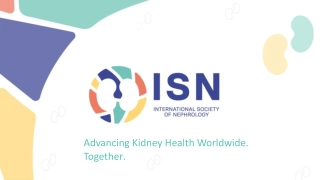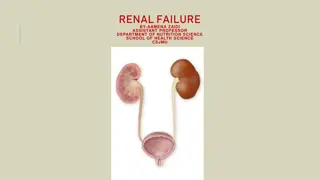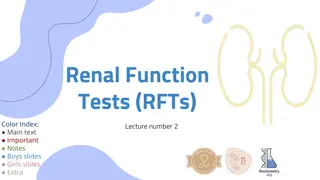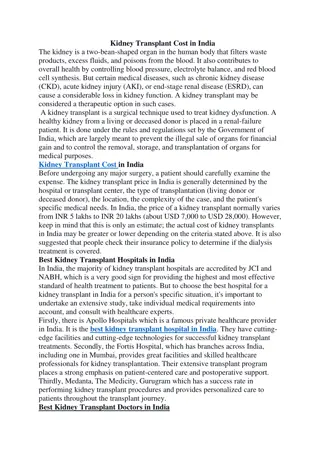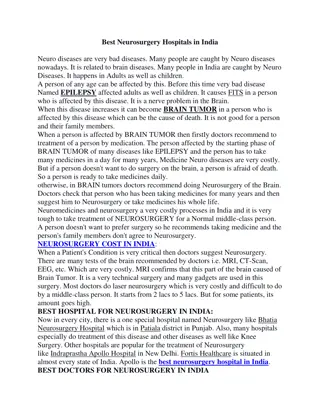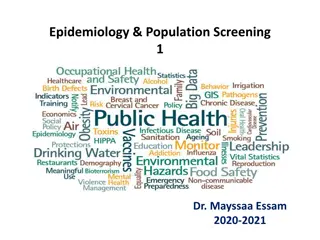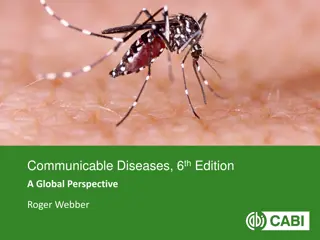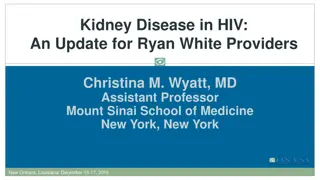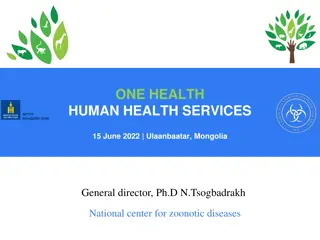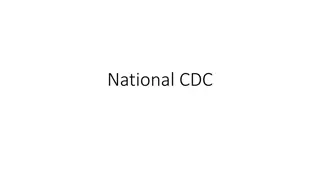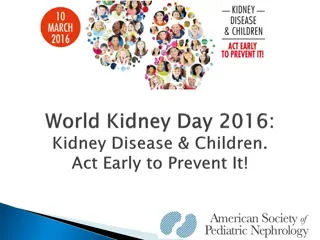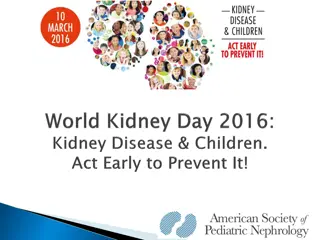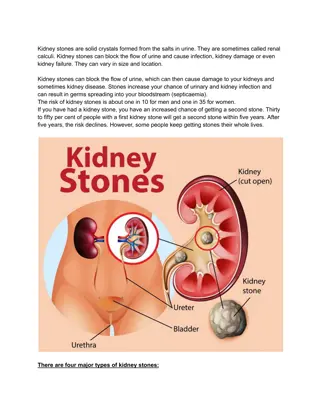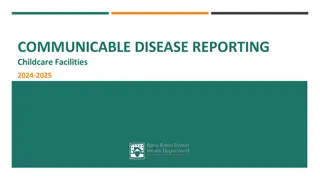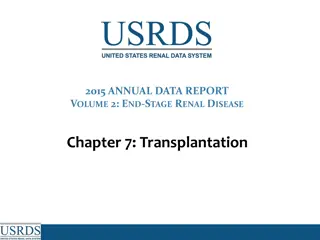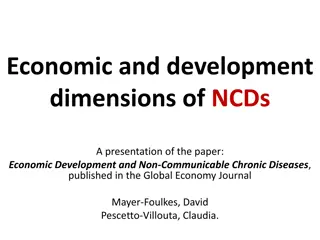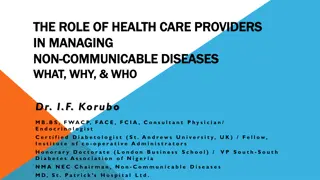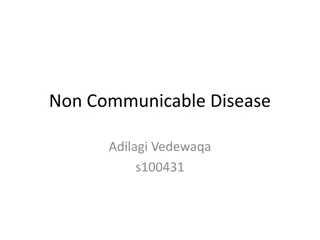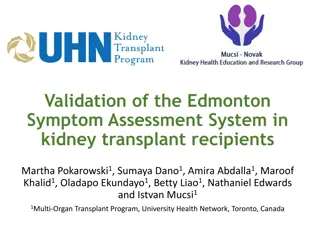Continuous Learning Approach for Preventing Kidney Disease and Non-Communicable Diseases
Addressing the global health crisis of Non-Communicable Diseases (NCDs), particularly Kidney Disease, through comprehensive prevention strategies. Emphasizing the need for upstream primary prevention, utilizing surveillance systems, prediction analytics, and tailored messaging to drive awareness and behavioral change at individual, health system, and community levels.
Download Presentation

Please find below an Image/Link to download the presentation.
The content on the website is provided AS IS for your information and personal use only. It may not be sold, licensed, or shared on other websites without obtaining consent from the author.If you encounter any issues during the download, it is possible that the publisher has removed the file from their server.
You are allowed to download the files provided on this website for personal or commercial use, subject to the condition that they are used lawfully. All files are the property of their respective owners.
The content on the website is provided AS IS for your information and personal use only. It may not be sold, licensed, or shared on other websites without obtaining consent from the author.
E N D
Presentation Transcript
Prevention of Non-Communicable Diseases by Continuous Learning System Approaches (Starting with Kidney Disease) Rajiv Saran, MBBS, MD, MRCP, MS Florence E. Bingham Professor of Nephrology Professor of Medicine and Epidemiology University of Michigan Director, United States Renal Data System (USRDS) Coordinating Center University of Michigan Ann Arbor, Michigan
Key Points Why: Non-Communicable Diseases (NCDs)? Why Kidney Disease? What: Comprehensive Prevention Strategy Going beyond the health system How: Principles and Practice of Surveillance & Learning Systems Where: State of Michigan, USA State in India (e.g., Punjab) National (e.g., the National VA Health System, USA) Invitation to Engage: Generating Funding (Grants, Contracts, Donations) Bringing a Global NCD Conference to Ann Arbor, Michigan, by 2020 2
Why Non-Communicable Diseases? NCDs (obesity, cardiovascular diseases, cancer, respiratory diseases, diabetes, kidney disease, substance abuse and mental health disorders, etc.) have emerged as the largest global health crisis of this century Nearly 70% of deaths and huge burden of disability worldwide Huge Societal Cost Current priority mostly downstream crisis management (MI, Stroke, ESRD, advanced illnesses) often due to misaligned financial incentives Upstream primary prevention is neglected; easier said than done 3
Why Kidney Disease? Simple to diagnose Simple laboratory tests Well recognized risk factors High and rising burden (14.8% of US adult population) Very low awareness High morbidity and mortality ESRD a devastating complication Very high societal cost ~120 billion/year for Medicare and the VA health system alone 4
How? Surveillance Systems to Utilize Learning Health System Principles Data Continued Surveillance Collection Health Problem of Interest Public Policy / Practice Change Analysis & Interpretation Dissemination 5
How? Prediction Analytics Generate Individual, Health System and Population level (Geospatial) Risk Profiles Design & Implement Tailored Individual, Health Systems and Community-level Messaging to Raise Awareness and Motivate Change Establishment of Robust Surveillance Systems Individual, Health Systems & Community-Level Outcomes 6
Multi-sectoral, Multi-disciplinary, Committed Partnerships Federal Agencies Michigan Department of Community Health Other Health Systems School of Public Health Michigan School of Engineering Medicine CMS, CDC, NIH Corporate Entities National, State and Local Government Foundations Health Insurers School of Information Business School (NKF, & Private Donors Charitable) 7
Active Existing Funding Existing and Ongoing Kidney Population Surveillance Systems at Michigan United States Renal Data System (USRDS) (2014 onwards) CDC CKD Surveillance System (2006 onwards) VA Renal Information System VA REINS (2012 2016) 8
Funding Procurement Efforts 1 100+ Change Competition (MacArthur Foundation) 2016/17 Linked up with several key stakeholders at UM Michigan Medicine (Internal Medicine/Nephrology, Cardiovascular Medicine, Diabetes, Family Medicine, etc.) School of Public Health (HBHE, Epidemiology, Biostatistics) School of Information School of Social Work Institute for Social Research Institute for Health Policy and Innovation 9
Funding Procurement Efforts so Far 2 VA Innovations Broad Agency Announcement 2017/18 Based upon the VA REnal Information System (VA REINS) created by our team (2012-2016) Collaboration between VA Kidney Program, VA Office of Rural Health, VA Academic Nephrologists, VA Innovations and Investigators at UM (Michigan Medicine, IHPI, School of Information and Ann Arbor VA) Result Awaited 10
An Invitation to Engage 1 To meet this challenge, we are assembling team with expertise in NCDs, public health, IT, social sciences, health policy, engineering, law, business, advocacy, and beyond Work with us to: Refine the vision Define the project(s) Plan the funding proposal(s) Help put plan(s) into action 11
An Invitation to Engage 2 U-M recently submitted a concept proposal for the World Federation of NCDs to host 2020 NCD World Congress in May/June 2020. Proposed conference theme: Promoting Wellness and Prevention of Chronic Disease through Learning Health Systems and Communities. The UM Proposal was selected from 5 applicant countries Opportunity to share early results of LHS NCDs project(s) at U-M. Spark a movement (local, regional, national and global), toward development of state-of-the-art learning health systems and learning communities dedicated to prevention of disease 12
Thank You !! 13


